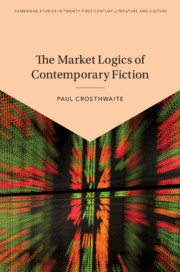Book contents
- The Market Logics of Contemporary Fiction
- Cambridge Studies in Twenty-First-Century Literature and Culture
- The Market Logics of Contemporary Fiction
- Copyright page
- Dedication
- Contents
- Acknowledgements
- Introduction
- Part I The Emergence of Market Metafiction
- Part II The Phantasmagorias of Contemporary Finance
- Part III The Market Knows
- Part IV The Moment of Market Metafiction
- Notes
- Index
Introduction
Neoliberalism, Financialization, and the Contemporary Literary Marketplace
Published online by Cambridge University Press: 04 July 2019
- The Market Logics of Contemporary Fiction
- Cambridge Studies in Twenty-First-Century Literature and Culture
- The Market Logics of Contemporary Fiction
- Copyright page
- Dedication
- Contents
- Acknowledgements
- Introduction
- Part I The Emergence of Market Metafiction
- Part II The Phantasmagorias of Contemporary Finance
- Part III The Market Knows
- Part IV The Moment of Market Metafiction
- Notes
- Index
Summary
The introduction begins by highlighting the novelist Tao Lin's attempt to sell shares in an unwritten novel - an especially striking manifestation of the market logics examined throughout the book. The introduction then maps the historical and conceptual ground of the project. Successive sections trace how the interlocking developments of neoliberalism and financialization since the 1970s have extended what Pierre Bourdieu calls a “pure market logic” to ever-widening domains of social life; how Fredric Jameson’s paradigm-defining theorizations of the contemporary nonetheless go too far in positing postmodernist culture as a straightforward expression of this logic; how the power of market forces in the present elicits a condition of ambivalence among contemporary writers that is neither simply critical nor “postcritical,” but combines the intense affective states of both positions; and, finally, how the publishing industry and book retail business have undergone their own neoliberal and financial revolutions over recent decades, with profound consequences for novelistic practice. The remaining section of the introduction summarizes the arguments of the book’s chapters and Coda.
Keywords
- Type
- Chapter
- Information
- The Market Logics of Contemporary Fiction , pp. 1 - 34Publisher: Cambridge University PressPrint publication year: 2019

